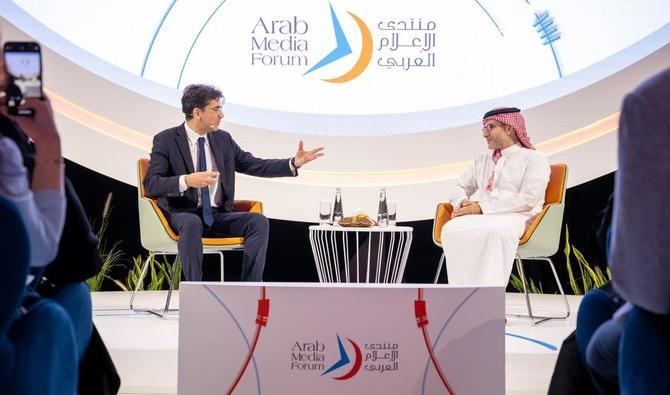The recent rapprochement between Saudi Arabia and Iran, brokered by China, was the right step, but there is still much to be done, experts said at the Arab Media Forum (Arab Media Forum) last Tuesday.
“It continues to support armed groups that Saudi Arabia opposes,” Afshin Molavi, a senior fellow at the Johns Hopkins University Foreign Policy Institute, said during the session titled “The Middle East: a region of opportunity or conflict,” alongside Faisal Abbas, editor-in-chief of Arab News.
Questioning whether the deal will succeed or not, Faisal Abbas pointed out that the Kingdom, due to its continued leadership, has over forty years of experience in dealing with Iran.
“The ideal scenario would be for the two countries to implement levers and work cooperatively to resolve the conflicts in Syria, Yemen, Iraq and Lebanon, of course, with the participation of local actors. The worst scenario would be to miss the opportunity to do so and for relations to remain unchanged,” said the editor-in-chief of Arab News.
Abbas also explained why China was better placed to negotiate the rapprochement deal, detailing how it exerts influence over Iran by investing billions of dollars in projects and making clear that there is no risk of negotiations start again every four years due to elections, as is the case in America.
In Molavi’s opinion, China, as mediator of the agreement, “comes with a grain of salt”, because Washington considers it its enemy, but he believes that rapprochement is the right step for the region.
However, the Arab perception of China differs from that of the West. A recent YouGov study conducted by Arab News on Palestine shows how Palestinians view China as a more honest mediator in dealing with their issue than the United States.
Mr. Abbas said that colonial powers such as France, the United Kingdom and the wars in which the United States participated are viewed negatively compared to China, whose political and economic involvement in the region has been mostly positive: “The Chinese don’t bring this burden.”
On the subject of the United States, Molavi noted that there is a shift in power and, although Washington remains a powerful country, the world is seeing a rise of other powers like China and India.
“Today, countries are proving that we now live in a world of multiple strategic alignments and I think Washington is starting to understand that it’s no longer the case that you’re either with us or against us.”
Molavi continued: “This can also be seen in the Abraham Accords, where on the one hand the UAE has this historic relationship and alliance with Israel, but then joins the Brics.”
Mr. Abbas described how exciting the dynamics are and discussed Saudi Arabia’s position on the issue, mentioning how the Kingdom has been reaching out for twenty years on the condition that a solution be found for the Palestinians. .
“Biden needs a foreign policy legacy and that will be an asset to him in the next election.”
The two speakers also discussed and highlighted the positive changes being made by Saudi Arabia and the UAE.
Mr. Abbas noted Saudi Arabia’s remarkable achievements and highlighted how they should be celebrated and shared, including the Saudi astronaut.
“Actions speak louder than words, facts are stubborn things. No amount of negative stories can erase these accomplishments. Saudi Arabia is the fastest growing G20 economy in the world.”
This article is originally published on arabnews.fr


